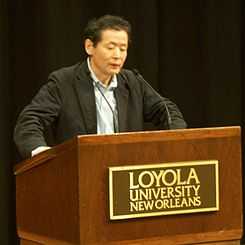Kojin Karatani

Kojin Karatani (柄谷 行人 Karatani Kōjin, born August 6, 1941, Amagasaki) is a Japanese philosopher and literary critic.[1]
Biography
Karatani was educated at University of Tokyo where he took a BA degree in economics and an MA in English literature. The Gunzō Literary Prize, which he received at the age of 27 for an essay on Natsume Sōseki, was the first critical acclaim as a literary critic. While teaching at Hosei University, Tokyo, he wrote extensively about modernity and postmodernity with a particular focus on language, number, and money, concepts which form the subtitle of one of his central books: Architecture as Metaphor.
In 1975, he was invited to Yale University to teach Japanese literature as a Visiting Professor, where he met Paul de Man and Fredric Jameson and began to work on formalism. Starting from a study of Natsume Sōseki, the variety of the subjects examined by Karatani became so wide that he earned the nickname The Thinking Machine.[citation needed]
Karatani collaborated with novelist Kenji Nakagami to whom he introduced the works of Faulkner. With Nakagami, he published Kobayashi Hideo o koete (Overcoming Kobayashi Hideo). The title is an ironic reference to “Kindai no chokoku” (Overcoming Modernity), a symposium held in the summer of 1942 at Kyoto Imperial University (now Kyoto University) at which Hideo Kobayashi (whom Karatani and Nakagami did not hold in great esteem) was a participant.
He was also a regular member of ANY, the international architects' conference which was held annually for the last decade of the 20th century and which also published an architectural/philosophical series with Rizzoli under the general heading of Anyone.
Since 1990, Karatani has been regularly teaching at Columbia University as a Visiting Professor.
Karatani founded the New Associationist Movement (NAM) in Japan in the summer of 2000.[2] NAM was conceived as a counter–capitalist/nation-state association, inspired by the experiment of LETS (Local Exchange Trading Systems, based on non-marketed currency). He was also the co-editor, with Akira Asada, of the Japanese quarterly journal, Hihyōkūkan (Critical Space), until it ended in 2002.
In 2006, Karatani retired from the chair of the International Center for Human Sciences at Kinki University, Osaka, where he had been teaching.
Philosophy
Karatani has produced a number of philosophical concepts such as "the will to architecture", but the best-known of them is probably that of "Transcritique", which he proposed in his book Transcritique, where he reads Kant through Marx and vice-versa. Writing about Transcritique in the New Left Review of Jan-Feb. 2004, Slavoj Žižek brought Karatani's work to greater critical attention. Žižek borrowed the concept of "parallax view" (which is also the title of his review) for the title of his own book.
Karatani has interrogated the possibility of a (de Manian) deconstruction and engaged in a dialogue with Jacques Derrida at the Second International Conference on Humanistic Discourse, organized by the Université de Montréal. Derrida commented on Karatani's paper, 'Nationalism and Ecriture' with an emphasis on the interpretation of his own concept of écriture.[3]
Bibliography
In English
- Origins of Modern Japanese Literature, Duke University Press, 1993. Translated by Brett de Bary
- Architecture as Metaphor; Language, Number, Money MIT Press, 1995. Translated by Sabu Kohso
- Transcritique: On Kant and Marx, MIT Press, 2003. Translated by Sabu Kohso
- History and Repetition, Columbia University Press, 2011. Translated by Seiji M. Lippit
- The Structure of World History : From Modes of Production to Modes of Exchange, Duke University Press, 2014. Translated by Michael K. Bourdaghs
In Japanese
- 畏怖する人間 [Human in Awe], Tōjūsha, 1972
- 意味という病 [Meaning as Illness], Kawadeshobō, 1975
- マルクスその可能性の中心 [Marx: The Center of Possibilities], Kōdansha, 1978
- 日本近代文学の起源 [Origins of Modern Japanese literature], Kōdansha, 1980
- 隠喩としての建築 [Architecture as Metaphor], Kōdansha, 1983
- 内省と遡行 [Introspection and Retrospection], Kōdansha,1984
- 批評とポストモダン[Postmodernism and Criticism], Fukutake, 1985
- 探究 1 [Philosophical Inquiry 1], Kōdansha, 1986
- 言葉と悲劇[Language and Tragedy], Daisanbunmeisha, 1989
- 探究 2 [Philosophical Inquiry 2], Kōdansha,1989
- 終焉をめぐって[On the 'End' ], Fukutake, 1990
- 漱石論集成 [Collected Essays on Sōseki], Daisanbunmeisha, 1992
- ヒューモアとしての唯物論 [Materialism as Humor], Chikumashobō, 1993
- “戦前”の思考 [Thoughts before the war], Bungeishunjusha, 1994
- 坂口安吾と中上健次[Sakaguchi Ango and Nakagami Kenji], Ohta Press, 1996
- 倫理21[Ethics 21], Heibonsha, 2000
- 可能なるコミュニズム[A Possible Communism],Ohta Press, 2000
- トランスクリティーク:カントとマルクス[Transcritique: On Kant and Marx], Hihyōkūkansha, 2001
- 日本精神分析[Psychanalysis of Japan or Analysis of Japanese Spirit], Bungeishunjusha, 2002
- ネーションと美学 [Nation and Aesthetics], Iwanami Shoten, 2004
- 歴史と反復[History and Repetition], Iwanami Shoten, 2004
- 世界共和国へ[Toward the World Republic], Iwanami Shoten, 2006
- 世界史の構造[The Structure of World History], Iwanami Shoten, 2010
- "世界史の構造"を読む[Reading "The Structure of World History"], Inscript, 2011
- 政治と思想 1960-2011[Politics and Thought:1960-2011], Heibonsha, 2012
- 脱原発とデモ[Denuclearization and Demonstration], Chikuma Shobo, 2012
- 哲学の起源[The Origin of Philosophy], Iwanami Shoten, 2012
- 柳田國男論[On Kunio Yanagita], Inscript, 2013
- 遊動論:柳田国男と山人[On Nomadization : Kunio Yanagita and Sanjin people roving over mountains], Bungeishunjusha, 2014
See also
- Fredric Jameson
- Arata Isozaki
- List of deconstructionists
Notes
- ↑ "Kojin Karatani at Stanford:Beyond the Trinity of Capital, Nation, and State A Special Series of Events with Japan's Leading Philosopher and Literary Critic at Stanford University, October 8-October 11, 2007". Department of Asian Languages. Stanford University. 2007. Retrieved 21 Mar. 2009. http://www.stanford.edu/dept/asianlang/cgi-bin/?q=karatani
- ↑ Harootunian, Harry. "Out of Japan: The New Associationist Movement". Radical Philosophy. Issue 108 (July/August 2001). Retrieved 21 Mar. 2009. http://www.radicalphilosophy.com/default.asp?channel_id=2187&editorial_id=9899
- ↑ Jacques Derrida, Introduction to Kōjin Karatani's "Nationalism and Ecriture"
External links
- Official website
- "Japan as Museum" by Karatani about Okakura Kakuzo.
|